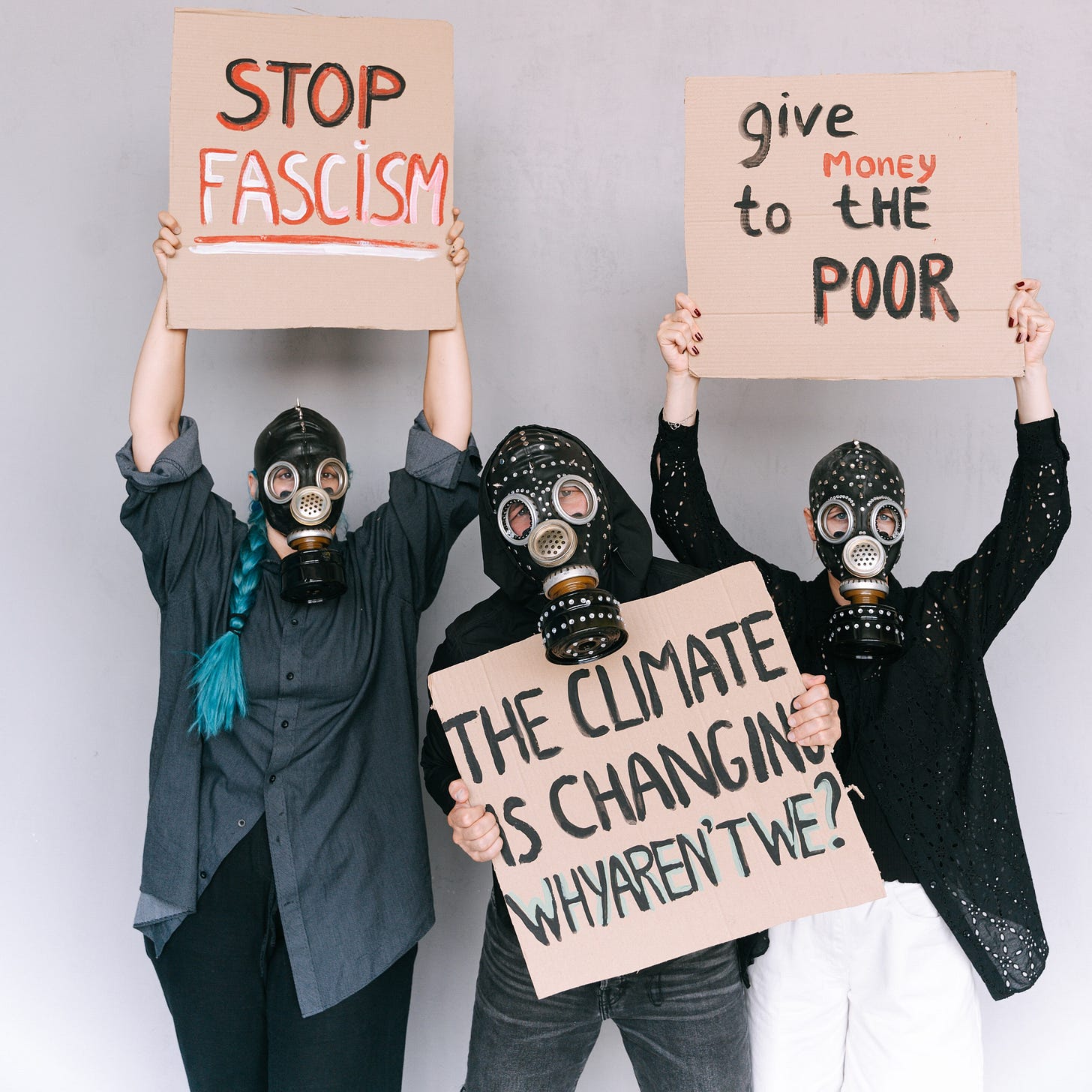Do words define reality?
Many seem to think so. Words are instead suppose to describe aspects of reality.
The meanings that words represent appear to change over time. From a logical perspective, this is a problem. Why? Every measurement, judgment or conclusion is only valid (i.e., consistent) if it deduces to a fixed point that does not change. Think about how a scale or thermometer drifts over time creating erroneous measurements.
Water does not change its freezing point, so why do our words drift from objective reality?
When words are redefined then our perception of reality drifts and creates an illusion.
The basic tool for the manipulation of reality is the manipulation of words. If you can control the meaning of words, you can control the people who must use the words.
— Philip K. Dick1
Distorting words and their definitions is the tool of a malicious gaslighter.
There is a very good, and ironic, example of this: fascism.
Many are unable to differentiate political propaganda (promise) from policy (behaviour). Labels like ‘communism,’ ‘socialism,’ ‘fascism’ are obfuscated by propaganda, which are political promises made to the public as tools of coercion and consent. Understanding implemented policy and the behaviour of a regime is what matters.
Examining foundational ideology is the only way to understand the behaviour of a fascist state, because behaviour and therefore political policy is a derivative of ideas.
But first, what is a definition and how are they created?
Words are symbols used to represent the contextual meaning of an idea.
The etymology of a word is its origin.
Definitions are semantic assertions associated to a word.
A definition is a human creation that uses etymology within a context.
It is often forgotten that (dictionaries) are artificial repositories, put together well after the languages they define. The roots of language are irrational and of a magical nature.
— Jorge Luis Borges2, Prologue to "El otro, el mismo."
Definitions should be succinct and direct.
There is a long list of definitions for fascism according to Wikipedia — a trusted source of unreliable information. The primary definition of fascism according to Wikipedia is:
Fascism is a far-right, authoritarian, ultranationalist political ideology and movement.
— Fascism, Wikipedia
The word “far-right” has no real meaning, because it describes a position from some centre. Does that centre ever change or drift? The centre is never directly defined. This definition of fascism describes very little and must be further elaborated by paragraphs of explanation. From this definition, we are led to believe fascism is akin to a monarchy which seeks to control activity within its domain.
Instead, we should carefully consider the etymology of fascism and its context.
1921, from Italian partito nazionale fascista, the anti-communist political movement organized 1919 under Benito Mussolini (1883-1945); from Italian fascio "group, association," literally "bundle," from Latin fasces (see fasces).
— fascist (adj.), Online Etymology Dictionary
The context of fascism involves the political movement (i.e., policies) of Benito Mussolini, which includes some “group association.”
The Doctrine of Fascism
Benito Mussolini (Jul. 29, 1883 - Apr. 28, 1945) — who dreamed to recreate the Roman Empire — was an Italian dictator from 1922 until 1943. He was executed on Apr. 28, 1945. Mussolini wrote The Doctrine of Fascism, which contains an introductory essay called Fundamental Ideas by Giovanni Gentile3 and a second part called Political and Social Doctrine by Benito Mussolini.
Below are excerpts from an English translation of The Doctrine of Fascism (1932) by Benito Mussolini, available online by the World Future Fund, and the Origins and Doctrine of Fascism by Giovanni Gentile.

If liberalism spells individualism, Fascism spells government.
The Fascist State lays claim to rule in the economic field no less than in others; it makes its action felt throughout the length and breadth of the country by means of its corporative, social, and educational institutions, and all the political, economic, and spiritual forces of the nation, organized in their respective associations, circulate within the State.
— The Doctrine of Fascism (1932), Benito Mussolini
A common claim is that fascism is the cooperation of corporations and the state, where cooperation is an alternative wording of “coordinated and harmonized.”
Fascism recognizes the real needs which gave rise to socialism and trade unionism, giving them due weight in the guild or corporative system in which divergent interests are coordinated and harmonized in the unity of the State.
— The Doctrine of Fascism (1932), Benito Mussolini
This is further elaborated by “footnote (16),” which references several of Mussolini’s speeches and asserts that fascism is a “full-blown Corporative state.”
XIV. The Corporative State.
Fascism seeks to replace the liberal state with a corporative syndicalist approach to government. This structure, in which unions of workers organize themselves to run their portions of economic life, better mirror the relation of state and individual than does classical liberal atomism. The state is immanent in every citizen; political structures should reflect that reality.— Origins and Doctrine of Fascism, Giovanni Gentile
[Translated by A. James Gregor4]
The corporate syndicate that forms a government over the people dictates all aspects of individual life. This is the differentiating aspect from classical liberalism, which values reason, individualism and personal freedom.
IX. The Totalitarian Character of the Doctrine of Fascism.
Fascist government does not cut and dice human life. The government is a governmental, religious, and moral unity. All falls within the purview of government. Fascism is totalitarian. That is the first point.— Origins and Doctrine of Fascism, Giovanni Gentile
[Translated by A. James Gregor]
Synonyms for fascism based on Giovanni Gentile and Benito Mussolini are:
Corporatism.
Society is organized by corporate groups.Totalitarianism.
The state dictates all aspects of individual life.
These domestic and international economic constraints also contributed to the supersession of liberalism in favor of state intervention and a directed economy. The free play of market forces, upon which economic liberalism was based, could no longer be risked. (p.348)
Thus, the liberal nightwatchman state was to be rejected in favor of one no longer constrained by the public-private distinction or limited by constitutional guarantees of associational pluralism and inviolable individual rights. (p.349)
— Italian Industrialists from Liberalism to Fascism: The Political Development of the Industrial Bourgeoisie (1906-1934), Franklin H. Adler5
Therefore, a fascist state — according to the original usage of Giovanni Gentile and Benito Mussolini — is a totalitarian corporate state, where government and corporate cooperation dictate all aspects of individual life.
A definition of fascism based on ORIGINAL use
Compare this with one of the many varying definitions. These definitions appear to describe the consequences of a corporate totalitarian state or contain instruments of propaganda, i.e., political promises made to the public.
(e.g., Racism, nationalism and violence are propaganda instruments used against the public).

The closest I could find.

Which is different when you follow through the link…

What is the purpose of a word that has so many meanings?
Confusion, distortion and trickery.
Just like the word inflation!
Concluding remarks
Is there a new fascist state?
Modern social justice uses a corporate veil to implement totalitarianism.
Totalitarianism weaponizes irony.
Take everything good and make it bad, everything bad and make it good, then dictate all aspects of individual life for 'public safety' or 'the greater good.'
Reason has been replaced with emotion. Individualism has been replaced with collectivism. Personal freedom has been replaced with state sanctioned privilege.
Fascism uses its own linguistic distortion to occult itself through self-righteousness.
Classical liberalism has been twisted into its opposite.
The irony.
Fascism is coming in the United States most probably, but it will not come under that name.
— Norman Thomas6
Fascist behaviour is any action the may benefit a totalitarian corporate state. Political affiliation or self-identity is a label and not behaviour. This definition encompasses any act of censorship, violence or disingenuous information favourable to government or corporate interests and their acquisition of power.
We should heed extreme caution of any so-called public / private partnership.
Woe to those who call evil good and good evil,
who put darkness for light and light for darkness,
who put bitter for sweet and sweet for bitter.
— Isaiah 5:20
The real battle is not black vs. white, left vs. right, men vs. women or gay vs. straight.
The real battle is: Freedom vs. Totalitarianism.
Good vs. Evil.
Philip Kindred Dick (Dec. 16, 1928 – Mar. 2, 1982) was an American science fiction writer.
Jorge Francisco Isidoro Luis Borges Acevedo (Aug. 24, 1899 – Jun. 14, 1986) was an Argentine short-story writer, essayist, poet and translator.
Giovanni Gentile (May 30, 1875 – Apr. 15, 1944) was an Italian philosopher, educator, and politician.
Anthony James Gregor (Apr. 2, 1929 – Aug. 30, 2019) was a political scientist, eugenicist and professor of political science at the University of California, Berkeley.
Franklin Hugh Adler (born Dec. 1, 1944) is a professor at Macalester College, Minnesota specializing in Political Theory.
Norman Mattoon Thomas (Nov. 20, 1884 – Dec. 19, 1968) was an American Presbyterian minister.










Top shelf.
💯👍🏻